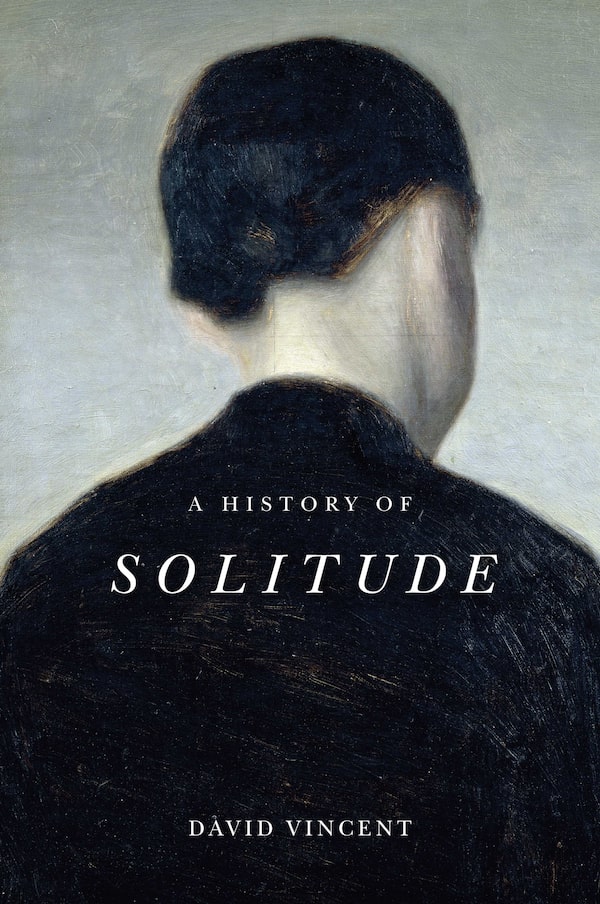
DV light blue shirt cropped.jpg put-fb-solitudeqa-0328 . david vincentCourtesy of manufacturer
When British professor David Vincent was researching his third book, A History of Solitude, he had no idea it would be published in the midst of COVID-19, a pandemic that has led to the self-isolation of millions of people around the world. Fascinated by the distinction between solitude and loneliness – and motivated by his concerns about Britain’s growing obsession with a “loneliness epidemic” – he sought to put the meaning of solitude into the proper context by studying its evolution over the last three centuries. From his home in the countryside near the Welsh border, Vincent, a social history professor at the Open University, tells The Globe and Mail that as businesses close, streets empty and people stay inside, it’s important to find healthy balance between “productive solitude” and the most “profound sociability” – even if it’s through Skype.

Courtesy of manufacturer
What is the difference between loneliness and solitude?
Solitude means being comfortable with your own company. Loneliness is being uncomfortable with your own company. The challenge in front of us now is to keep everyone on the right side of the border – toward solitude not loneliness. Solitude only becomes a problem when it is not chosen and you’re locked into it, which is how some people are beginning to feel. Governments have to compensate for that by engendering a shared sense of purpose. It is their job to help people understand that we are all in this together, and even though we are socially distancing ourselves from each other, it’s in the best interests of all of us.
While you were writing the book, the British Conservative government appointed the world’s first Minister for Loneliness. What did you make of that?
We got into a panic about loneliness long before this [virus] happened. Around the time Tracey Crouch was appointed Minister for Loneliness and published her strategy entitled A Connected Society, there was much talk about a so-called epidemic of loneliness, which got under my skin. You would think with what’s happening in the world now people would stop talking about epidemics in that sense. To treat loneliness in that way – to label it an epidemic – was a fundamental misuse of the language.
The word self-isolation sounds scary. Should it be?
It is a human nature to disengage from the world from time to time. In the late 18th century, solitude just meant being alone, and it was the practice of only educated men. It was thought to be dangerous, challenging and, if not done properly, could drive people mad. Women were not considered mentally robust enough to cope, and working people didn’t have time for it. However, over time, that attitude changed. In the 20th and 21st century, solitude gradually became mainstream; something actively pursued, valued and built around activities such as gardening, meditation, fishing, walking and crosswords. Solitude became the product of a new commercial order where people had more spending power and better housing.
Why is an understanding of the word “isolation” important in the context of what is going on in the world today?
There is a tendency to treat isolation as an unprecedented and inherently destructive experience, when in effect, it’s something that is actively chosen by 30 per cent of all households in the Western world. The movement between solitude and social living is very important: Solitude is bearable if you can choose to move back into the company of others when you want to. It starts heading toward loneliness when you can’t make that choice. The current political and social culture matters a great deal. If your Mr. Trudeau makes everybody think that they want to self-isolate then it will be easier for everyone. If, on the other hand, people perceive the state as incompetent or heavy-handed, it will not go down well. Choice is key.
Are we ever truly alone in this digitally connected world?
Britain is just beginning to feel the bite of social isolation. We live deep in the English countryside, so in one sense we’re well-protected, but it is also difficult being disconnected from friends and family. However, my wife and I feel fortunate because we can easily maintain connections with our kids and grandkids through our devices, particularly Skype. Others, who are aged or impoverished, might not be so lucky. In my little village, a network has been set up to help those less fortunate with shopping or medicine. Initiatives such as this, where social support is maintained at a distance, are key to ensure people stay hopeful and relatively content.
Despite the increased need for social distancing, are you reasonably confident society will weather the storm?
There is a need to stress that this is not life as usual. This is a watershed moment in modern history, and I would never want to minimize the scale of the threat. However, in the face of it, it is necessary to think calmly and carefully about the distinction between solitude and loneliness and do everything we can to keep people on the right side of the scale.
Expand your mind and build your reading list with the Books newsletter. Sign up today.